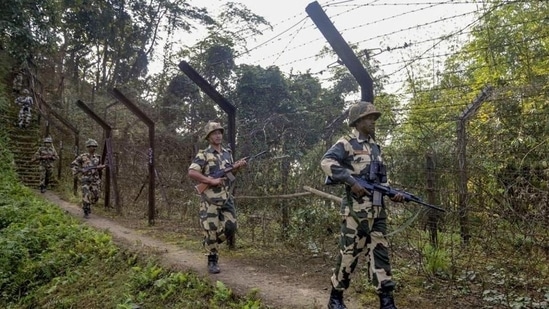Context
-
The Bureau of Police Research and Development (BPRD) has recommended to the Centre that, India should have Integrated Law Enforcement Centres (ILECs) on all its borders on the lines of the United States’ Department of Homeland Security (DHS), the UK’s Border Agency and the European Union’s Frontex to deal with cross-border crimes including infiltration, terrorism, smuggling of drugs, cattle, fake currency, arms, etc.
About Integrated Law Enforcement Centres
- Integrated Law Enforcement Centres will be stationed at existing and proposed Integrated Check Posts (ICPs) established by the Land Port Authorities of India, Ministry of Home Affairs.
- These centres will be on the lines of police stations and will help different stakeholder government agencies on the border to work together.
- These centres will undertake the protection role of premises of ICPs, collaboratively detect, register and investigate the cases related to different types of border crimes, and finally dispose of such cases.
- Besides personnel from border guarding forces of the area, there will be officials from different stakeholder agencies, such as Customs, Narcotics Control Bureau, National Investigation Agency, Directorate of Revenue Intelligence, Enforcement Directorate, Local Police, Anti-Trafficking (Human) Cells, Intelligence
Key Features
- The ILECs on all its borders on the lines of the United States’ Department of Homeland Security (DHS), the UK’s Border Agency and the European Union’s Frontex to deal with cross-border crimes including infiltration, terrorism, smuggling of drugs, cattle, fake currency, arms, etc.

Source : HT - The ILECs, working inside the existing Integrated Check Posts (ICPs), will have the mandate to register, investigate and dispose of all types of cross-border crimes with jurisdiction clearly defined and coinciding with government regulations with respect to border guarding forces.
- They will maintain a wealth of cross-border crime data and process it for short-, medium- and long-term trends. The data will be collated from different stakeholder agencies, mass-and-social-media, as well as cross-border sources. Various factors affecting border security, such as political, economic, social, technological and legal environments etc. will be monitored.
- The ILECs will establish a situation room, where on the basis of collected, collated and analysed information from various sources, near real-time situations of the borders will be built up; and on the basis of time-series data, the trends of border-crimes in a particular sector of border will be analyzed and utilized for planning routine operations by border guarding forces.
- It has been recommended that each ILEC can have small self-sustaining investigative units of Customs, Narcotics Control Bureau (NCB), National Investigation Agency (NIA), Directorate of Revenue Intelligence (DRI), Enforcement Directorate (ED), local police, Anti-Trafficking (Human) Cells, Intelligence Bureau (IB), Special Bureau of Research and Analysis Wing (RAW) and wildlife wing of ministry of environment, apart from officials from border guarding forces.
Significance of ILECs
- The ILECs will lead to synergy in the efforts of different agencies. The overall effectiveness of agencies while working in unison is likely to scale up in comparison to the existing situation, where they are working in their respective silos. For example, the powers of interception and electronic surveillance available with IB/RAW etc. can be complemented with the expertise available with NCB, the reach and manpower availability of BSF, the investigative skills and experience of the local police to detect and destroy modules focused on narco-terrorism.
- Effective enforcement of border management not only prevents / minimizes trans-border criminal activity including smuggling, human trafficking, induction of Fake Indian Currency Notes (FICN) in the country, etc. but also promotes trans-border trade and economic activity, thereby giving tremendous financial benefits to the nation.
- Integrated Law Enforcement Centers envisage pooling of resources of different agencies and mutual sharing by them. This ensures optimal utilization of resources and overall cost cutting and increased efficiency in governance with regards to law enforcement on borders.
- The proposed arrangement is likely to significantly enhance the effectiveness and efficiency of the overall law enforcement on the border and ensure strong deterrence against the criminals and greater compliance with law.
- The proposed arrangement does not require a separate arrangement to operate. In fact, it seeks the process of re-engineering of the existing set up, without / with minimum requirement of additional resources in terms of manpower and infrastructure and resulting in more desirable outcomes.
- All the wasteful expenditure gets avoided in Integrated Law Enforcement Centres which function on the dictum of pooling of resources, including infrastructure and would operate from within the premises of already sanctioned ICPs.
Way Forward
- Law and Order is a ‘State subject’. Given the delicate balance of power between the Centre and States in India, which is ‘Federal in nature but unitary in spirit’, an overarching institutional arrangement would require strong political will at the Central level as well as accommodation by the states.
- A workable and politically feasible solution has to be necessarily found in the interest of national security, through collaboration of all bordering states with the Union of India within the existing institutional arrangements
- A Committee on Combating Trans-Border Crimes can be composed of senior representatives of IB, NIA, CBI, NCB, members of the Police of bordering states and of Border Guarding Forces. This Committee can meet each month to review and monitor the entire gamut of issues pertaining to trans-border crimes.
- The ILECs will promote Integrated Border Management in a holistic and comprehensive manner. It will ensure a proper blend of national security and economic development.
Security Current Affairs for UPSC : Click Here
